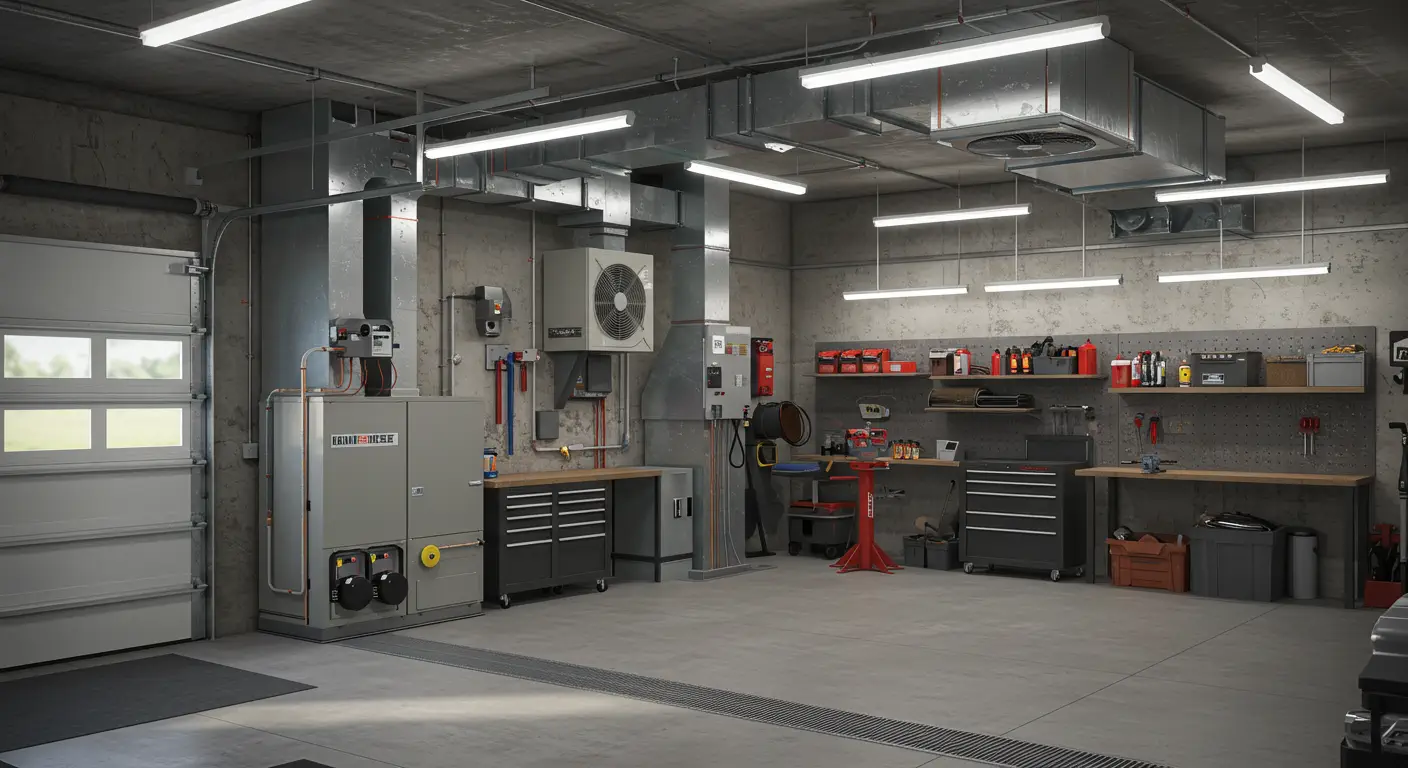Garage Heating & Air Conditioning in Cumming, GA
Reliable garage heating & air conditioning in Cumming, GA with Res Air LLC. Enjoy comfort year-round. Call us today to schedule trusted HVAC installation!
Garage Heating & Air Conditioning in Cumming, GA
Keeping a garage comfortable year-round in Cumming, GA requires solutions built for hot, humid summers and the occasional cold snap. Whether your garage is a workshop, hobby space, extended living area, or vehicle storage, properly designed garage HVAC from Res Air LLC protects tools and finishes, improves comfort, and reduces moisture-related damage. This page explains the best garage heating and air conditioning options, how systems are sized and installed, safety and ventilation considerations specific to Cumming homes, and the maintenance plan that keeps a garage system reliable.
Why Garage HVAC Matters in Cumming, GA
Cumming sits in a humid subtropical climate: long, warm summers with high humidity and relatively mild winters that can still dip into freezing on rare occasions. Typical garage construction in the area often lacks the insulation and air sealing of conditioned living space, making garages subject to large temperature swings and moisture intrusion. That combination can lead to:
- Condensation On Vehicles And Stored Items: Accelerating rust and mold
- Uncomfortable Or Unusable Workshop Conditions: Especially during summer heat or cold nights
- Fumes And Pollutants Lingering: Without proper ventilation
A garage HVAC system from Res Air LLC tailored to how you use the space addresses these problems while controlling humidity and energy use.

Common Garage HVAC Issues in Cumming, GA
- Undersized Or Poorly Located Equipment: Cannot overcome thermal losses from single-car doors and minimal insulation
- Excess Humidity And Condensation: Common during summer months
- Unsafe Combustion Appliance Installation: Or inadequate exhaust for gas-fired heaters
- Inadequate Condensate Drainage Or Improper Electrical Supply: For mini-splits and packaged units
- Lack Of Zoning And Controls: That allow efficient temperature management between home and garage
Garage Heating and Cooling Options
Choose a system based on garage size, insulation level, intended use, and whether you need cooling, heating, or both. Res Air LLC helps homeowners match the right system to their needs.
- Ductless Mini-Split Systems: Ideal for garages with no existing ductwork. Provide both cooling and heating with high efficiency and modest installation intrusion. Multi-zone heads allow temperature control in divided garage areas or workshops.
- Packaged Rooftop Or Wall-Mounted Packaged Units: Suitable for larger garages or where a single compact outdoor unit is preferred. Often paired with short duct runs or flexible plenums.
- Electric Unit Heaters And Baseboard Heaters: Simple, robust heating choice for seldom-used garages or when cooling is not required. Quick to install but can be less efficient for continuous use.
- Gas-Fired Unit Heaters: Fast, powerful heat for larger spaces; must be installed with proper venting and combustion air.
- Infrared Radiant Heaters: Good for spot heating in workshop areas where you need direct warmth without heating the entire volume.
- Through-Wall Or Window Air Conditioners And Portable Units: Lower-cost cooling solutions for intermittent use but provide limited winter heating and less humidity control.
Assessment and Sizing Considerations
Proper sizing and system selection depend on how the garage will be used and the thermal characteristics of the space:
- Intended Use: Workshop with occupants, living conversion, vehicle storage, or mixed use. Occupancy hours change capacity needs.
- Insulation And Air Sealing: Ceiling, walls, and especially the garage door greatly affect load. Improved insulation reduces equipment size and operating cost.
- Ventilation Needs: If vehicles will be started inside or if chemicals are stored/used, you need higher ventilation and possibly dedicated exhaust.
- Orientation And Sun Exposure: West-facing garages can gain significant heat in afternoon sun.
- Local Climate Factors: Account for Cumming humidity when sizing dehumidification capacity and selecting equipment with effective moisture control.
A heat load and cooling load calculation should be performed by Res Air LLC for accurate sizing rather than relying on rule-of-thumb capacity.
Recommended Installation Practices
- Outdoor Unit Placement: Place outdoor units where they get airflow and are protected from landscaping and mulch; allow clearance for service access.
- Indoor Airflow Design: Mount heads or registers to avoid direct airflow onto workstations or vehicle finishes.
- Refrigerant And Drain Line Installation: Run refrigerant lines and condensate drains with proper slope and insulation; freeze protection may be needed in line sets.
- Electrical Safety: Ensure electrical circuits, breakers, and disconnects match equipment specifications and local code.
- Noise And Vibration Control: Install vibration isolation to minimize noise transfer into attached living spaces.
- Combustion Appliance Safety: For gas appliances, follow combustion air and venting requirements; seal penetrations and provide proper clearances.
- Insulation Upgrades: Improve garage insulation and weatherstripping on doors before or during HVAC installation to maximize system performance.
Thermostat Zoning and Controls
Zoning and smart controls are particularly valuable for garages because usage tends to be intermittent:
- Separate Thermostat For The Garage: Lets the system run only when needed without affecting the house.
- Multi-Zone Mini-Splits: Offer independent control of multiple heads or areas.
- Programmable Schedules Or Occupancy Sensors: Reduce runtime and energy waste.
- Humidity Sensors: Help maintain a stable environment to prevent condensation and mold growth.
- Remote Monitoring: Can alert homeowners to system faults before they become serious problems.
Safety and Ventilation Concerns
Safety is a critical part of any garage HVAC plan in Cumming homes:
- Avoid Sharing Residential Furnace: Never rely on a furnace in the living space to heat a sealed garage without ensuring proper combustion air and exhaust.
- Carbon Monoxide Protection: If using gas-fired heaters, install detection and ensure exhaust is properly routed and maintained.
- Make-Up Air Supply: Provide adequate make-up air when running powerful exhaust fans, especially if appliances or vehicles are operated inside.
- Post-Operation Ventilation: Ventilate after fuel-powered equipment operation to remove exhaust and harmful gases.
- Safe Intake Placement: Avoid routing HVAC intake near areas where vehicles or equipment are stored that can off-gas volatile compounds.
Cost Factors and Investment Considerations
Instead of price ranges, consider the main factors that influence total project cost:
- System Type And Capacity: Mini-split, packaged unit, gas heater, radiant
- Complexity Of Installation: Refrigerant line runs, electrical upgrades, structural penetrations
- Insulation And Envelope Upgrades: Weatherstripping and garage door improvements
- Safety Requirements: Ventilation or make-up air solutions for compliance
- Control Upgrades: Zoning or smart integration
Working with Res Air LLC helps you understand these drivers and prioritize investments for comfort, safety, and long-term operating savings.
Maintenance Plan to Keep Systems Reliable
Routine maintenance extends equipment life and preserves efficiency:
- Seasonal Tune-Ups: For heat and cooling functions including coil cleaning, refrigerant checks, and electrical inspections
- Filter Replacement Or Cleaning: Mini-split filters typically require periodic cleaning every few months in dusty workshop environments
- Condensate System Inspection: Inspect drains and pans for clogs or standing water
- Safety Device Testing: Test carbon monoxide alarms if combustion appliances are present
- Motor And Fan Maintenance: Lubricate motors and check belt-driven fans where applicable
- Thermostat And Sensor Verification: Verify calibration and operation, and keep outdoor units clear of debris and stored items
Benefits of a Properly Designed Garage HVAC System
A correctly specified and installed garage HVAC system in Cumming by Res Air LLC delivers:
- Year-Round Comfort: For work and hobby spaces
- Moisture And Damage Protection: Against mold, rust, and condensation affecting tools, finishes, and vehicles
- Improved Indoor Air Quality: Through ventilation and filtration
- Energy Efficiency: When combined with insulation and zoning controls
- Safe Operation: When fuel-fired appliances are installed with the proper ventilation and detectors
A tailored approach—assessing how you use the garage, upgrading the thermal envelope, and selecting the right system and controls with Res Air LLC—delivers the best long-term comfort, safety, and value for garages in Cumming, GA.
Take Control of Your Garage Comfort with Res Air LLC
Your garage deserves the same comfort and protection as the rest of your home. At Res Air LLC, we specialize in designing and installing garage heating and cooling systems built to handle Cumming’s hot summers and chilly nights. From ductless mini-splits to powerful heaters, we deliver solutions that fit your lifestyle, protect your vehicles and tools, and add value to your property. Don’t settle for a space that’s too hot, too cold, or too damp—transform your garage today. Call Res Air LLC now to schedule your free consultation and start enjoying year-round comfort.


Financing
We make comfort affordable with flexible financing options through Optimus and Synchrony, giving you stress-free payment solutions for your HVAC needs.


Customer Testimonials
At Res Air, our customers’ satisfaction speaks louder than words. From fast emergency repairs to flawless system installations, homeowners trust us for reliable comfort and professional service.


.png)
.jpg)
